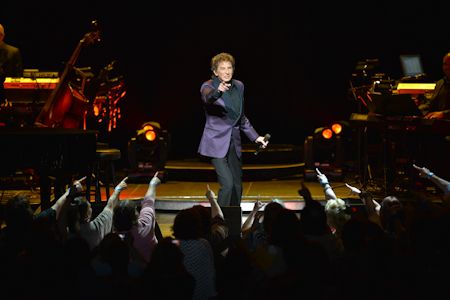From the moment Barry Manilow's back-lit silhouette appeared on the Palace stage to huge applause on Friday night until, literally, the final curtain when he led an a capella sing-along of "One Voice" to say goodnight, the theater felt suffused with a joyful, delighted energy. With banks of percussionists on each side of the stage and an array of backing musicians between them, Manilow moved easily from center stage to piano to keyboard, playing songs that are so much a part of the fabric of pop music history that you can't help but feel somehow at home, cocooned in warm nostalgia. Manilow obviously understands this about his own music, and he doesn't try to disguise it. He would introduce his songs by sharing an image of an old record cover or photo projected on the screen over the stage, and share brief anecdotes about his career and growing up in Brooklyn. He said his three choices were sports (which he was no good at), music, or joining a gang. "Can you imagine -- me -- in a gang?" he asked the audience with smiling incredulity. No, Barry, we can not. Clearly, you're a lover, not a fighter.
With the ease born of many years of performing, he gave the audience what it wanted -- a set of greatest hits from "It's a Miracle" to "Could it Be Magic" straight through to "Copacabana" and "I Write the Songs." Often flanked by his two young, smiling dancers and backup singers, the music arced and soared over the theater, key changes abounded, and as my husband says, "The man can write a push." I kept wishing he would just sit at the piano and play an entire song (or two or three) unaccompanied, sort of Manilow Unplugged, but alas, Barry likes it BIG -- and that apparently will never change.
I am at least old enough to remember when Manilow's songs were ubiquitous on mainstream radio, and while they may have receded into the distance of easy-listening oldies stations, hearing them from the man himself reminds you that these are really beautiful melodies and intricate arrangements -- a style that has gone out of vogue these days, especially when paired with unabashedly sentimental lyrics. There's no irony here, no bravado, no Adele-like defiance in "Mandy." I'm in love and I'm sad. The end. The simplicity and universality of that experience, perfectly rendered in a song, is precisely what made them huge, world-wide hits.
When he launched into "Even Now," I had my eyes on a trio of women in front of me who were obviously attending the show together. One of them was crying and her friend had her arm around her shoulders as if to help bear her up through the song. Who knows what emotional chord it struck, or what memory it brought to the surface, but it reminded the cynic in me of the power that music has to root itself in you and wring you out. It was touching and genuine, and no number of smart-alecky, know-it-all critics can minimize the importance of that experience to the people for whom it has meaning.

Flanked by backup singers

Photos: Ryan Armbrust



